Bachir Gemayel
| Bachir Gemayel بشير الجميّل | |
|---|---|
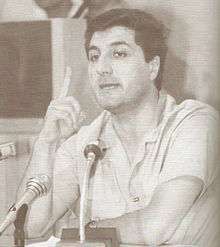 | |
| President-elect of Lebanon | |
|
In office Did not take office[lower-alpha 1] | |
| Preceded by | Elias Sarkis (preceded Amine Gemayel) |
| Succeeded by | Amine Gemayel (succeeded Elias Sarkis) |
| Leader of LF | |
|
In office 1976–1982 | |
| Succeeded by | Fadi Frem |
| Personal details | |
| Born |
10 November 1947 Achrafieh, Beirut, Lebanon |
| Died |
14 September 1982 (aged 34) Achrafieh, Beirut, Lebanon |
| Political party | Kataeb |
| Spouse(s) |
Solange Totonji (1977–1982, his death) |
| Relations | Amine Gemayel (brother) |
| Children |
Maya Gemayel (1978-1980) Youmna Gemayel Nadim Gemayel |
| Parents |
Pierre Gemayel Genevieve Gemayel |
| Alma mater | Saint Joseph University |
| Occupation | Lawyer |
| Religion | Maronite Catholicism |
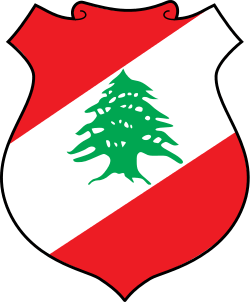 |
| This article is part of a series on the politics and government of Lebanon |
|
Bachir Gemayel (Arabic: بشير الجميّل Bashīr al-Jimayyel, also romanized al-Jumayyil and El Gemaiel. Arabic pronunciation: [baˈʃiːr ʤɪma.jɪl]; November 10, 1947 – 14 September 1982) was a Lebanese leader and president-elect. He was a senior member of the Phalange party and the supreme commander of the Lebanese Forces militia during the early years of the Lebanese Civil War (1975–90).
He was elected president on 23 August 1982 while the country was torn by civil war and occupied by both Israel and Syria. He was assassinated on 14 September 1982, along with 26 others, when a bomb exploded in the Beirut Phalange headquarters. The bomb was planted by Habib Tanious Shartouni.[1] The Federal Bureau of Investigation blamed the Syrian Social Nationalist Party (SSNP).[2]
Early life
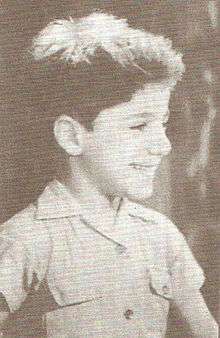
Bachir was born in the Achrafieh neighborhood of Beirut on 10 November 1947, the youngest of six children. The Gemayel family originated from Bikfaya village in the Matn District of Lebanon and is one of the most influential Christian families in the country. His father was Pierre Gemayel, who founded the Phalange party in 1936 as a youth movement. Bachir Gemayel attended the Jesuit Collège Notre Dame de Jamhour and the Institution Moderne du Liban (IML)- Fanar. He completed his university education at St. Joseph University (Université Saint-Joseph - USJ) in Beirut. After teaching for three years at the Lebanese Modern Institute, he graduated in 1971 with a bachelor's degree in law and another in political sciences in 1973. In 1971, Gemayel studied at The Center for American and International Law near Dallas, Texas in the United States. Qualifying in 1972, he joined the bar association and opened an office in Hamra Street, West Beirut.[3]
Early activities in the Kataeb Party
Bachir became a member of the Kataeb Party´s youth section when he was 12 years old.[4] Bachir realized the dangers that surrounded Lebanon in 1958, so he spent a lot of time with the organized political wing of the Kataeb Party.[4] He attended the meetings organized by the Kataeb Student Section, and he was the president of the Kataeb Circle in St. Joseph University between 1965 and 1971.[4]
In the late 1960s, he underwent paramilitary training in Bikfaya, and he was appointed squad leader of a militia unit of the Kataeb Regulatory Forces - KRF (the Party's military wing formed in 1961). Then in the early 1970s, he formed the “Bikfaya Squad” within the RKF, where he became acquainted with the basics of military combat.[4] In 1968, he participated in a student colloquium organized by the newspaper Orient, following events which occurred across Lebanese universities between the Muslim and leftist Pan-Arabist students supporting the Palestinians in Lebanon on one side, and Lebanese Christian nationalist (Phoenicist) students (whom Bachir represented) on the other.
After the 1968-69 clashes between the Lebanese Army and the PLO, Bachir gathered a group of Christian students, and started training them in the Kataeb-run Tabrieh training camp, located near Bsharri in the Keserwan District mountains. This was the start of what would later become the Lebanese Forces. At this stage, he was a junior militia commander under the orders of William Hawi, the founder and head of the KRF.[4]
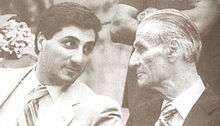 Bachir with his Father Pierre |
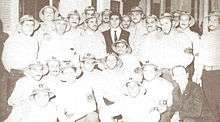 Bachir with Kataeb Regulatory Forces militiamen |
In 1970, Bachir was briefly kidnapped by Palestinian militants in Lebanon and taken to the Tel al-Zaatar refugee camp. He was released 8 hours later.
Bachir became a member of the “BG Squad” formed by William Hawi. He was a revolutionary in the party. He became close with Jean Nader, the leader of Achrafieh at that time, and became the vice president of that Lebanese Capital district, a position that he held from 1971 till 1975.[4]
Bachir became the head of the “BG Squad” after its members found him as a leader more close to their views. This group was formed of 12 specially trained members such as Fouad Abou Nader, Fadi Frem, Elie Hobeika and others. They were fierce fighters, and they were known for their violent performance in the field. This group was out of the direct control of the party.[4] He had his own views and principles, and he wanted to run for the Vice Presidency of the party, but his men said to him that they want him as the leader of the “Lebanese Forces” and not the VP of a party. In addition, many members of the party did not want him as the VP because he was the son of Pierre Gemayel, the founder and president of the party. The elections were cancelled and did not take place until after his assassination.[4]
He submitted his resignation from the party in 1976, but it was rejected. This was because the Kataeb Party had approved the entrance of the Syrian Army to Lebanon to put an end to the war, but Bachir refused to accept this, being strongly against the Syrian intervention because he believed that Syria wanted to annex Lebanon. He came to this conclusion because the Syrian officials repeatedly stated that Lebanon is part of Syria and that the Syrian Army doesn’t need anyone’s permission to enter Lebanon. Moreover, at that time, the Syrian educational system used to teach that Lebanon is a Syrian district.[4]
Military command
Conflict with the PLO
In 1975, Gemayel was accused by the LNM of being responsible for the Black Saturday massacre of Palestinians and Lebanese Muslims. According to Phalange member Karim Pakradouni, Bachir admitted to him that while being in an emotional state for the killing of four Phalangists earlier that day, he ordered his militiamen into the streets. Bachir added that when the situation developed into something he did not agree with and civilians were being killed, he tried to stop the killings but failed to.[5] However, according to Michel Samaha, another Phalange member, Bachir was outside Beirut, arriving after the killing of civilians had started. Michel Samaha added that Bachir was one of the many senior members of the Phalange Party who tried to stop this massacre.[5]
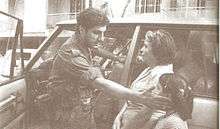
Christian East Beirut was ringed by heavily fortified Palestinian camps from which kidnappings and sniping against Lebanese civilians became a daily routine. Christian East Beirut became besieged by the PLO camps, with severe shortages of food and fuel. This unbearable situation led the Kataeb Forces and their allied Christian militias to besiege the Palestinian camps embedded in Christian East Beirut one at a time and bring them down. On January 18, 1976, Bachir led the invasion of the heavily fortified Karantina camp that was located near the strategic Beirut Harbor: About 1,000 PLO fighters and civilians were killed.[6] The Palestinian PLO and as-Saiqa forces retaliated by attacking the isolated defenseless Christian town of Damour about 20 miles south of Beirut on the coast, during the Damour massacre in which 1,000 Christian civilians were killed and 5,000 were sent fleeing north by boat, since all roads were blocked off.[7] The Maronites retaliated with the invasion of the Tel al-Zaatar camp that same year (The camp was placed under siege for 52 days by the Tigers militia led by Dany Chamoun). Bachir played an important role in the last stages of the battle: he sent a group of his forces that moved through the sewers and they blew up the ammunition storage in the camp. This incident was considered to be the lethal blow that led the fall of the camp.[8] The Christian militias also fought against the PLO and LNM militias at the Battle of the Hotels in central Beirut. Bachir led the battle for the Holiday Inn that had an important strategic location. The battle was a success for Bachir's troops, and they were able to move the PLO out of the hotel. After insuring the safety of the rear lines and their effectiveness (necessary for the safety of Christian East Beirut), Bachir and his troops decided to abandon the hotel.[9]

In 1976, with the death of William Hawi, killed by a sniper during the battle of Tall Al-Zaatar, Bachir became head of the Kataeb Regulatory Forces militia. Later that year, he became a leading member of the Lebanese Front, a coalition of several Christian parties, and commander of their military wing, the Lebanese Forces. A military coalition of several Christian militias which not only opposed the PLO but also the Syrian Army presence, who had entered Lebanon at first to assist in defeating Palestinian militants, before turning into occupiers.[10]

Bachir led his troops in the infamous “Hundred Days War” in Lebanon in 1978, in which the Lebanese Forces successfully resisted the Syrian shelling and attacking of Eastern Beirut for about three months before an Arab-brokered agreement forced the Syrians to end the siege. Syrians took high buildings such as Burj Rizk Achrafieh and Burj El Murr using snipers and heavy weapons against civilians. The soldiers stayed for 90 days. Another major clash took place near the Sodeco area in Achrafieh where the Lebanese Forces fought ferociously and led the Syrian army out of the Rizk Building.[11] This War led to the withdrawal of the Syrian troops from East Beirut and the free Christian Areas. At this time, Israel was the primary backer of the Lebanese Front’s militia.
In 1981 at Zahlé in the Beqaa, the largest Christian town in the East, confronted one of the biggest battles – both military and political – between the Lebanese Forces and the Syrian occupying forces. The Lebanese Forces were able to confront them and reverse the result of the battle of 1981 with the help of 92 Lebanese Forces soldiers (L.F Special Forces: The Maghaweer) sent from Beirut as well as the towns inhabitants. Regardless of the very bad weather and heavy bombing, convoys were sent in the snow to Zahle. The battle of Zahle gave the Lebanese Cause a new perspective in the International Communities, and by some was regarded as military and diplomatic victory. It strengthened Bashir Gemayel's position because of his leadership and important role in this battle. The battle started on 2 April 1981, and finished with a cease fire and Lebanese Internal Security Forces gendarmes were sent to Zahle. The 92 Lebanese Forces' commandos returned to Beirut on 1 July 1981.[12] (See: Battle of Zahleh for more details)
Tensions within the Lebanese Front

Despite its increasing success in its battles against the PLO and the Syrian troops two factors led to the eventual demise of the Lebanese Front.
Following the killing of many Phalangist members, in addition to a senior Phalangist by members of the Marada Brigade militia, which was led by a fellow member of the Lebanese Front, Tony Frangieh, Bachir called for a meeting to decide on what to do about this situation. At first, the decision was to capture Tony Frangieh, and force him to surrender the members of the Marada militia who killed the Phalangists. However, there was concern about the consequences of this move. So, the decision was changed after many talks between the Phalangists present at the meeting. It was decided that the goal of the operation would be to capture the members of the Marada militia who killed the Phalangists and it would be done on Tuesday to be sure that Tony Frangieh would have finished his weekend vacation and left Ehden. On 13 June 1978, Bachir sent a squadron of his men led by Samir Geagea and Elie Hobeika to Ehden, but what Bachir did not know is that Tony Frangieh never left Ehden since his car did not work. As soon as the squadron arrived, bullets were flying all over their heads, so they retaliated and this led to the killing of Tony Frangieh and his family, in addition to tens of members of the Marada militia. The incident is known as the Ehden massacre. Bachir was very angry about what happened, but he stood by his men. [13]
In 1980, in order to stop the clashes happening inside the Christian areas, between the Kataeb Militia and the Tigers Militia, and in order to eliminate the possibility of an Intra-Christian war, Bachir sent his troops to the town of Safra, where Dany Chamoun and members of his Tigers Militia were vacationing. The Tigers under the control of Elias el Hannache were exterminated in what was later named Safra massacre. Dany's life was spared and he sought refuge in West Beirut, but Camille Chamoun's support of the attack was interpreted as him believing that his son’s militia was getting too out of control.[14]
Israeli invasion of Lebanon and Bachir's election
Israel invaded Lebanon in 1982.[15] Defense Minister of Israel, Ariel Sharon, met with Bachir months earlier, telling him that the Israeli Defense Force were planning an invasion to uproot the PLO threat to Israel and to move them out of Lebanon.[16] While Bachir did not control Israel’s actions in Lebanon, the support Israel gave the Lebanese Forces, militarily and politically, angered many Lebanese leftists.
Bachir met with Hani Al Hassan (representative of the PLO) and told him that Israel would enter and wipe them out. Bachir told him to leave Lebanon peacefully before it was too late. Hani left and no reply was given to Bachir.[17]
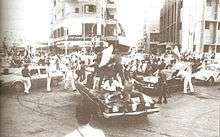
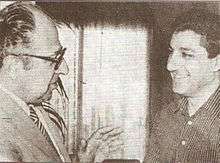
Israel invaded and the PLO were expelled from Lebanon in August 1982. During the invasion, the Israelis wanted the Lebanese Forces to assist the Israeli Army militarily by fighting the Palestinians and Muslims in West Beirut; however, Bachir refused that because he said that his forces would not assist an invading army. By now, Bachir had announced his candidacy for president. He was backed by the United States, who sent peacekeeping troops to oversee the withdrawal of the PLO from Lebanon. Bachir had requested that they stay longer to keep Lebanon stable until he could reunite it, but his request was denied. The Mossad also contributed to his presidency.[15] On 23 August 1982, being the only one to declare his bid, Bachir was elected president.[18][19]
On 1 September 1982, two weeks before his assassination and only one week after his election, Bachir met the Israeli Prime minister Menachem Begin in Nahariya. During the meeting, Begin demanded that Bachir sign a peace treaty with Israel as soon as he took office in return of Israel's earlier support of Lebanese Forces and he also told Bachir that the IDF would stay in South Lebanon if the Peace Treaty wasn't signed. Bachir was furious at Begin and told him that the Lebanese Forces didn't fight for seven years and that they didn't sacrifice thousands of soldiers to free Lebanon from the Syrian Army and the PLO so that Israel can take their place. Bachir also added that he will not sign the Peace Treaty without national consensus on the matter.
Begin was reportedly angry at Bachir for his public denial of Israel's support. Bachir refused signing a peace treaty arguing that time is needed to reach consensus with Lebanese Muslims and the Arab nations. This angered the Israelis because they knew that it is almost impossible for the Lebanese Muslims to agree on a Peace Treaty. They realized that Bachir was starting to distance himself from them.[20]
On 12 September 1982, in an attempt to fix the relations between Begin and Bachir, Ariel Sharon had a secret meeting with Bachir in Bikfaya. During the meeting, Bachir told Sharon that the Lebanese Army would soon enter into the Palestinian Camps to disarm any remaining fighters. They also agreed that the Lebanese Army would attack the Syrian Army's positions in Lebanon assisted by the Israeli Army. In addition, Sharon tried to convince Bachir about signing a Peace Treaty, but Bachir did not change his position on this matter.
Bachir had planned to use the IDF to push the Syrian Army out of Lebanon and then use his relations with the Americans to pressure the Israelis into withdrawing from Lebanese territory.[21]
Time as President elect
25 August : Deployment of International Separation Forces (mainly American, French, and Italian)
30 August : Yasser Arafat leaves Beirut to Athens
1 September : Meeting between Presidents Bachir and Elias Sarkis with American Defense Secretary Caspar Weinberger
2 September : Opening the path of Sodeco that was previously considered as a separation line between East and West Beirut
4 September : The Lebanese Army enters West Beirut for the first time since 1973
9 September : The Lebanese Army enters the Palestinian Camp Bourj el-Barajneh and that was restricted since 1969 by the Cairo Agreement
10 September : The International Separation Forces leaves Lebanon after completing its task
11 September : Beirut's economic market resumes its activities; Bachir meets with former Lebanese Prime Minister Saeb Salam.
13 September : Beirut's seaport resumes its activities
During these 21 days, fighters from the Lebanese Forces were prohibited from wearing their army clothes and also from carrying their weapons in the streets. The Lebanese Army was the only armed force in the streets.
Assassination
On 14 September 1982, Bachir was addressing fellow Phalangists at their headquarters in Achrafieh for the last time as their leader and for the last time as commander of the Lebanese Forces. At 4:10 PM, a bomb was detonated at the headquarters, killing Bachir and 26 other Phalange politicians. Whereas rumors spread that Bachir had gotten out alive, it was confirmed the next morning by the Lebanese Prime Minister Shafik Wazzan that Bachir was indeed assassinated.[22]
Habib Shartouni, a member of the Syrian Social Nationalist Party and also a Maronite Christian, was later arrested for the assassination. His sister was living in the apartment above the room Bachir was in. He had visited her the previous day and planted the bomb in her apartment. The next day, he called her and told her to get out of the building. Once she was out, he detonated the bomb from a few miles away from the building. When he came back to check on his sister, he was immediately arrested. He later confessed to it, saying he had done this because “Bachir had sold the country to Israel.” A reporter was heard telling him "You didn't kill a man, you killed a country." He was imprisoned for 8 years, until Syrian troops took over Lebanon at the end of the war and freed him on 13 October 1990. Amine Gemayel did not condemn Habib Shartouni because of immense Syrian pressure.[23]
Various theories exist as to other parties that had a hand in the assassination. Many point fingers at the Syrian government and then-Syrian President Hafez al-Assad for having knowledge of the assassination attempt and for backing Shartouni.[24] Even after they kept pressuring him, Bachir refused to immediately give Israel peace.[25]
Aftermath
Condemnations poured in from around the world, including from the United Nations Security Council in Resolution 520 as well as from American President Ronald Reagan. Reagan had been one of Bachir's most staunch supporters, saying "this promising young leader had brought the light of hope to Lebanon."[26]
Bachir Gemayel's older brother Amine Gemayel was then elected as president, serving from 1982 to 1988. Rather different in temperament, Amine Gemayel was widely regarded as more moderate than his brother.
Many of Bachir's followers were dissatisfied with Amine. Eventually, the Lebanese Forces became independent from the Phalange and its own political party.
Sabra and Shatila Massacre
The Sabra and Shatila massacre was the killing of between 762 and 3,500 civilians, mostly Palestinians and Lebanese Shiites, by a militia close to the Kataeb Party, also called Phalange, a predominantly Christian Lebanese right-wing party in the Sabra neighborhood and the adjacent Shatila refugee camp in Beirut, Lebanon.
The massacre was presented as retaliation for the assassination of newly elected Lebanese president Bachir Gemayel, the leader of the Lebanese Kataeb Party.
Legacy
Throughout the postwar period, the cult of Bashir Gemayel was the most visible commemorative phenomenon in parts of Beirut especially Ashrafieh. The leader of LF, is revered with a wealth of different signs, ranging from spray-painted profiles and posters in the public space of the entry hall of Beirut's old Jesuit university, University Saint-Joseph.
Personal life
Bachir Gemayel's widow, Solange Gemayel, works to keep his legacy alive through the Bachir Gemayel Foundation, a political and informational organization.
Bachir's eldest daughter, Maya, was murdered on 23 February 1980 at 18 months of age by a car bomb intended for her father.[27][28] He had two surviving children: His second daughter, Youmna, was born later in the year and received her degree in political science in Paris. She is now working towards her Masters in Management at ESA (École supérieure des affaires) in Beirut. Gemayel's son, Nadim, who was born a few months before Bachir was killed, was a law student and political activist, and was elected as a member of the Lebanese Parliament in 2009.
Political views
On relationship with the United States
The relations between Lebanon and the United States had a high priority rating on Gemayel’s agenda, and occupied a sizeable portion of his time and efforts. Bachir Gemayel believed that the U.S. and Lebanon are natural allies since they enjoy a common cultural affinity, similar ideological beliefs, free economic systems and strong commitment to human rights and dignity. He believed in the U.S. leadership of the Free World and he was confident that Washington would strengthen its ties to Lebanon. the Lebanese people, he declared, do not wish that their American friends fight their battle and suffer casualties. However, they look to the U.S. for economic and military aid so that they themselves may free their country.
When Alexander Haig, U.S. state secretary, subsequently declared that the fact of restoring peace and security to Lebanon would achieve the same result for all the countries of the region, Bashir wholeheartedly agreed with him and supported the new policy of the United States saying : “Mr. Alexander Haig is quite right in proclaiming this new attitude loud and clear. In fact, that its exactly what we have been saying for the past seven years!”
Bashir did not minimize the role of the Lebanese communities in the USA : he considered that his fellow-Lebanese living in the United States had an important role to play, and distinguished two stages in this context : the first stage, in which the Lebanese overseas communities would not play any role at all, i.e. the passive stage; and a positive stage in which they would promote the cause of their father land and lobby for a modification in U.S. foreign policy dealing with Lebanon. He said : “Two years ago, we were not present in the American Forum. The Palestinians have their lobby, so do the Jews, the Kurds and the Copts... As for us, whenever a representative of this country goes to the States, it is usually to collect donations to fix the belfry of such or such a Church, or to obtain a grant for some school or other in a village... But when our presence there became larger, people began to sit up and take interest in the Lebanese Cause...”
Bashir’s approach was not limited to this alone : he called for an efficient reorganiztion of the overseas Lebanese collectivities in the United States because, according to his views, they represented a non-negligible source of political and financial power. He suggested : “There is a vital necessity to reorganize the groups of Lebanese emigrants in a practical and modern manner, in order to create our own lobby, to promote the cause of our country in America. We cannot ignore the fact that the United States constitute the world’s center of gravity and that their influence in the Middle-East conflict is preponderant.” He stressed the importance of maintaining the best relations with the United States, particularly in Lebanon itself through the medium of U.S. Ambassador Philip Habib and the United States’ Embassy in Beirut. No effort must be neglected to enlist the active political support of the greatest nation in the world for the Lebanese cause. Bashir was confident that such good relations existed already:... “We entertain excellent relations with Philip Habib, with the United States’ Embassy in Beirut, and with the State Department in Washington through our offices abroad. We enjoy close relations with all the centers of power and gravity throughout the world.”
With regard to Ambassador Philip Habib’s mission in Lebanon, Bashir expressed the wish to see these efforts continue : “I hope that Ambassador Habib’s mission here will be pursued until we clear up all our problems with his help. In our present predicament we Lebanese are in dire need of friendship from abroad, to assist up in overcoming our difficulties and help us stand on our feet again...”
On relationship with European countries
Relations between Lebanon and the European States deteriorated because the latter also tried to solve the Middle-East problem at the expense of Lebanon. In addition to this factor, many European countries had adopted the obsequious policy of fawning on the Arab States in order to secure their oil supplies. This was done, of course, at the expense of the Christians, of their security, their very existence. Bashir referred to both these factors in one of his speeches : “Europe and many other States are not able to digest the Christian presence in this corner of the world, because it is a stumbling-block to most of their ambitions in this area... The Americans and the West have not yet assimilated the fact that we, the Christians of the Orient, represent their last line of defense against a return to the dark ages, against terror and blind fundamentalism, against those who seek to annihilate all the values of civilization and of their culture... Today, they want to ‘sell us down the river’ for a barrel of oil!”
Arab countries
Gemayel firmly believed that Lebanon has a great role to play in emancipation of the Arab world but that Lebanon must be respected and trusted as an equal and be free of foreign intervention (including Arab intervention) and that Arab governments must understand that Lebanon is a sovereign state and has right to reject any policy contrary to its national interests.
He warned the Arab world not to exploit the friendship and cooperation of the Lebanese people by attempting to settle Middle East conflicts at Lebanon's expense. He acknowledged, however, that during his visit to Taef, he was advised by his Saudi hosts that they understand Lebanon's problems and position on the PLO and Syria. Saudi leaders publicly lauded him for his leadership and vision.
Gemayel insisted in his talks that the PLO and Syrian armed presence in Lebanon is not negotiable or open for compromise since it undermines Lebanon's sovereignty which cannot be divided among non-Lebanese armies.
He also praised the efforts deployed by Saudi Arabia and Kuwait in helping Lebanon, and he called for stronger relations with these two countries. "The Lebanese people," he declared, "will reserve a special friendship for the Saudis and their Arab friends."
Institutions
Al-Ashbal: its first camp was organized under the patronage of Bashir in Jbeil scout camping grounds (1975).
Popular Committees: launched by Bashir in 1976, their aim is the people’s participation in the organization of daily life.
Hamat Airport: created by Bashir in 1976 for special tourist trips and for the export of agricultural products....
Radio Free Lebanon : founded by Bashir in 1978 to explain to the world the reality of the Lebanese cause.
Radio 102 : out of Bashir’s desire for a commercial station in order to alleviate the burden of the war (1979).
Delta Computer : founded in 1979 as a specialized information body related to all components of social organization.
Help Lebanon : founded to take care of children and alleviate the consequences of the war.
Lebanese Broadcasting Corporation (LBC) : launched in 1980 as a national, educational, cultural and non-commercial television.
Gamma Group : an institution including specialists to plan the building of a modern state in all of its sectors (1982).
The Lebanese Cultural Association : created in 1982 to deal with intellectual, literature and artistic affairs as well as Lebanese civilization.
Achrafieh Merchants Committee : created in 1982 to revive the economy and trade and organize the market.
Achrafieh Festival Committee : created in 1982 to organize fairs and exhibitions and to encourage artistic activities.[29]
Books about Bachir
- Dameer wa Tareekh (ضمير وتاريخ)
- Tareekh fi Rajol (تاريخ في رجل)
- Rajol el Nahda (رجل النهضة)
- Words from Bachir [30]
| Preceded by Elias Sarkis |
President Elect of Lebanon (assassinated before being sworn in) – |
Succeeded by Amine Gemayel |
See also
- List of attacks in Lebanon
- Amine Gemayel
- Lebanese Civil War
- Lebanese Forces
- Kataeb Party
- Kataeb Regulatory Forces
References
- ↑ Elected President on 23 August 1982 as the only candidate, for a term set to begin on 23 September 1982 and end on 22 September 1988, but never took office as he was assassinated on 14 September 1982.
- ↑ Reuters (10 March 1982). "Phalangists identify bomber of Gemayel as Lebanese leftist". The New York Times.
- ↑ Neil A. Lewis (18 May 1988). "U.S. Links Men in Bomb Case To Lebanon Terrorist Group". The New York Times.
- ↑ "Bashir Gemayel (1947-1982)". Bachir Gemayel. Retrieved 4 July 2012.
- 1 2 3 4 5 6 7 8 9 Hayek, Georges (2010). History in a Man – Bachir Gemayel. p. 68.
- 1 2 Archived 22 June 2011 at the Wayback Machine.
- ↑ Harris (p. 162) notes "the massacre of 1,500 Palestinians, Shi'is, and others in Karantina and Maslakh, and the revenge killings of hundreds of Christians in Damur"
- ↑ "Historical Fact: The Massacre and Destruction of Damour". Lebanese Forces. Retrieved 4 July 2012.
- ↑ "The Battle of Tel el Zaatar 1976". Liberty 05. Retrieved 4 July 2012.
- ↑ "Lebanon: Beirut's Agony Under the Guns of March". Time. 5 April 1976.
- ↑ Interviews with Elie Karameh, Edmond Rizk, Louis Karam, Naji Boutrous and Salim Reaidi conducted in March 1995
- ↑ Video on YouTube
- ↑ "Historical Fact: The Battle of Zahle - 1981". Lebanese Forces. Retrieved 4 July 2012.
- ↑ Archived 29 October 2008 at the Wayback Machine.
- ↑ Grange, South Australia; Thomas Hutchinson (1980-07-07). "Safra massacre". En.academic.ru. Retrieved 2012-12-30.
- 1 2 Bsisu, N. (2012). "Israeli Domestic Politics and the War in Lebanon" (PDF). Lights: The MESSA Journal. 29. Retrieved 23 March 2013.
- ↑ "Israel and Lebanon - Allies - Part 2". YouTube. 20 August 2007. Retrieved 30 December 2012.
- ↑ قصة الموارنة في الحرب - جوزيف أبو خليل
- ↑ Hayek, Georges (2010). Bachir Gemayel - History in a Man. self-published. p. 278.
- ↑ Hudson, Michael C. (1997). "Trying Again: Power-Sharing in Post-Civil War Lebanon" (PDF). International Negotiation. 2: 103–122. doi:10.1163/15718069720847889. Retrieved 4 July 2012.
- ↑ Cobra - From Israel to Damascus
- ↑ Khalife, Nabil (2008). Lebanon in Kissinger's Plan. Byblos Center for Research. p. 271.
- ↑ From Beirut to Jerusalem by Thomas Friedman
- ↑ "Bachir Gemayel Community Site - Who is Habib El-Shartouni ?". Bachirgemayel.org. Retrieved 2012-12-30.
- ↑ "Wars of Lebanon - People". Wars.meskawi.nl. Retrieved 2012-12-30.
- ↑ "The New Lebanon Crisis". Time. 27 September 1982. Retrieved 26 April 2010.
- ↑ Statement on the Assassination of President-elect Bashir Gemayel of Lebanon
- ↑ "Beirut Bomb Kills 8; Christian Militia Chief Believed to Be Target; Fought Palestinians and Leftists". The New York Times. 24 February 1980. p. 10.
- ↑ "Syrian chronicles 1973-1990". Tayyar. Archived from the original on 19 December 2011. Retrieved 11 April 2013.
- ↑ Archived 21 September 2010 at the Wayback Machine.
- ↑ "Words from Bashir: Understanding the Mind of Lebanese Forces Founder Bashir Gemayel from His Speeches: Rani Geha: 9781442160743: Amazon.com: Books". Amazon.com. Retrieved 2012-12-30.
| Wikimedia Commons has media related to Bachir Pierre Gemayel. |
External links
- Bachir Gemayel Community Site (Bachir Gemayel Foundation site)
- The Lebanese Phalanges - Kataeb
- Bachir Gemayel Squad Website